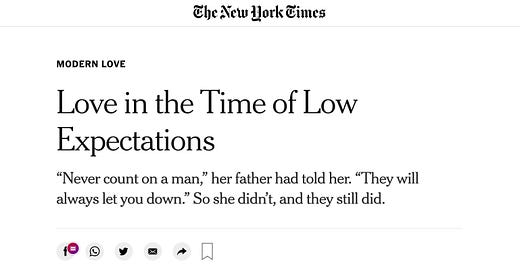Forager, recently acquired by Algonquin, is the memoir I thought I’d never write. I’ve been running away from writing this book my entire life.
I walked away from a book contract many years ago, because I wasn’t ready to betray my family. I was embarrassed I had wasted everyone’s time, so I became a teacher and gave up writing. Then last year, during the Christmas holiday, I submitted an essay to The New York Times Modern Love column. I knew it wouldn’t be published, but that was the point. As a way of encouraging my students to get out of their comfort zones and take risks, I asked them to collect rejection slips over the break. And since I practice what I preach, I submitted to a notoriously selective editor to retrieve my first one.
What is modern love? I had no idea. I married at twenty and my love life since then has been pretty tragic. But I tell my students to write toward what makes them uncomfortable. So I began writing about a relationship that felt unresolved and shameful. And as I unraveled why I had loved someone who couldn’t love me, I was taken back to the mountain of my youth. The man in question stood in for the home I couldn’t go back to.
A week later, Dan Jones called me. A week after that, my essay appeared in the Times. A week after that, agents began emailing me. I chose one, drafted a proposal and it sold.
And then I was confronted with the reality that I had backed myself into a corner. Now I have to write the book I’ve never wanted to write.
Forager is a literary memoir about survival training, about what sustains us when we’re hungry, and how the natural world can be a route to trusting ourselves. As a child, I was raised to survive the Apocalypse, so I learned skills necessary to battle hunger, thirst and cold, and I learned to trust wild animals more than humans, because their behavior can be predicted. I grew up learning how to survive in the natural world, which has given me a deep understanding of my animal self.
My grandparents started a cult in 1931. As a family business, a cult is a little like the mafia; what you see on the outside isn’t the truth of how things operate. What went on behind closed doors shamed, scattered and silenced us. The subculture of a family, even a dysfunctional one, has deep roots. We can be more intimate with ourselves when we understand what we are connected to. The wounds caused by my mother didn’t begin to heal until I accepted that my attachment to the land is our attachment to each other. When we forget our kinship with the land, our kinship with ourselves and each other becomes pale.
There is a difference between preppers and survivalists. Preppers hoard ammunition, food, and sometimes cash or gold to avoid secular assimilation, and/or prevent the government from dictating the circumstances of their lives. Survivalists use whatever we have at hand in the moment as a resource. Part of our survival training was accepting that we would never know when the Apocalypse would happen, so we could never be fully prepared. The training was to learn to live with what was left behind.
My mother taught us to adhere to the rules of the rigorous religious community we were born into, while preparing to survive when the system breaks.
Forager is structured as a series of stories around edible plants. Each chapter introduces a specific plant and how to make use of it in the wild, accompanied by a story illustrating some aspect of my survival in a family that taught me to prioritize community at the cost of self. The stories will invite readers on a journey of a cult experience, layering the beauty of community with the deleterious effects of unquestioned compliance to the mercurial mandates of a narcissistic leader, building toward an understanding of how a relationship with nature can lead us to a healthier relationship with ourselves, our animal bodies and our inherent interdependence with this planet.
So many of us in modern society are deeply hungry, starving for something we don’t know how to find. Hunger for community, touch, and the natural world aren’t often recognized as a reason for mindlessly eating from the surplus widely available. Although foraging isn’t as practical as getting food from a market, it feeds more than our nutritional needs, and can be a vital part of a healthy relationship to one’s body as a natural system.
The freedom of survival training is knowing what your real needs are and how to meet them.
The mountain of my youth held me together. Loving and holistically caring for plant and animal wildlife has saved me, over and over. The reader will journey to a place they’ve never been, and as they come to know and love this particular mountain, they will better understand their own relationship to the natural world.
Acknowledging the relationship between predator and prey, Forager circles around the shame of victimization. Part memoir, part survival guide, the story is told from the perspective of a daughter learning to grieve her mother, uncover the gifts of her unconventional past, and make a pilgrimage back to nature, which is a pilgrimage back to our most authentic self.
—
Michelle Dowd is a journalism professor and contributor to The New York Times, Alpinist, Catapult and other national publications. She is Faculty Lecturer of the Year for 2019-2021 at Chaffey College, where she founded the award-winning literary journal and creative collective, The Chaffey Review, advises Student Media, and teaches poetry and critical thinking in the California Institutes for Men and Women in Chino. Her first book, Forager: Field Notes from a Wild Life, is forthcoming with Algonquin Press.




